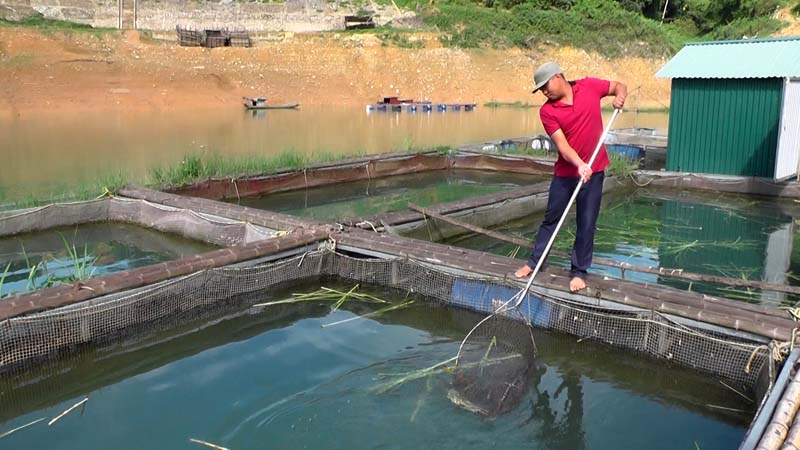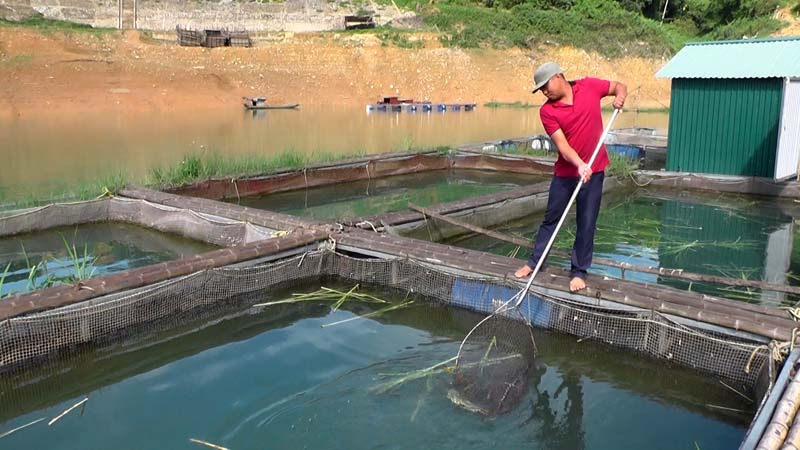
(HBO) - Tien Phong commune in Da Bac district has 10 out of the 12 hamlets
being located by the Hoa Binh lake which has rich and diverse aquatic resources.
Therefore, more than 300 households have focused on developing caged fish farming with over 800 cages.
 In 2018, Le
Dinh Hoi in Tup hamlet, Tien Phong commune, Da Bac district provided 6 tonnes
of fish to the market, earning 200 million VND in profit.
In 2018, Le
Dinh Hoi in Tup hamlet, Tien Phong commune, Da Bac district provided 6 tonnes
of fish to the market, earning 200 million VND in profit.
Caged fish farming was initiated in
the locality before 2000. However, as science and technology have not been
applied in the production process, and the consumption market is not stable, the
model has developed ineffectively.
From 2013, locals in Muc, Tup and Dieng hamlets has been focusing on developing
strongly caged fish farming models with varieties of Chien fish (Bagarius bagarius), Lang fish (Hemibagrus) and Tram den (Mylopharyngodon piceus). The profits from each cage developed effectively is estimated to be 20 - 30
million VND per year.
In order to encourage and support residents
in Tien Phong commune in particular, and those from other communes by the Hoa
Binh lake in general, the provincial People’s
Committee issued a decision on implementing policies to support caged fish
farming in the locality in the period of 2015 - 2020.
Accordingly, 142 local households have
been provided with 315 fish cages worth nearly 3 billion VND. In addition, the
commune has directed sectors and agencies to strengthen coordination in organising
training courses and transferring science and technology to attract the
participation of aquatic breeding households. Local people have been supported in accessing to preferential capital to expand
the model.
Xa
Van Thuc, Chairman of the communal People’s Committee, said per capita income
in the locality in 2018 reached 18 million VND, and the rate of poor households
was at 59.86 percent.
Therefore, the locality authorities have determined that caged fish farming is
a sustainable poverty reduction model to help local people improve their income
and promote poverty reduction.
According to data from the Hoa Binh Provincial Party Committee, the industrial production index for the first six months of 2025 is estimated to have increased by 20% compared to the same period last year. This marks the highest year-on-year growth rate for this period since 2020.
In the first six months of 2025, Hoa Binh province’s export turnover was estimated at 1.145 billion USD, marking an 18.11% increase compared to the same period in 2024. Import turnover was estimated at $ 804 million, a 17.15% increase, which helped the province maintain a positive trade balance.
The lives of the ethnic minority farmers in Tan Lac district have gradually improved thanks to the new directions in agricultural production. This is a testament to the collective strength fostered through the professional associations and groups implemented by various levels of the district’s Farmers’ Union.
With the motto the "product quality comes first,” after nearly one year of establishment and operation, Muong village’s Clean Food Agricultural and Commercial Cooperative, located in Cau Hamlet, Hung Son Commune (Kim Boi district), has launched reputable, high-quality agricultural products to the market that are well-received by consumers. The products such as Muong village’s pork sausage, salt-cured chicken, and salt-cured pork hocks have gradually carved out a place in the market and they are on the path to obtaining the OCOP certification.
In the past, the phrase "bumper harvest, rock-bottom prices" was a familiar refrain for Vietnamese farmers engaged in fragmented, small-scale agriculture. But today, a new spirit is emerging across rural areas of Hoa Binh province - one of collaboration, organisation, and collective economic models that provide a stable foundation for production.
Maintaining growing area codes and packing facility codes in accordance with regulations is a mandatory requirement for agricultural products to be eligible for export. Recently, the Department of Agriculture and Environment of Hoa Binh province has intensified technical supervision of designated farming areas and packing facilities to safeguard the "green passport" that enables its products to access international markets.



 In 2018, Le
Dinh Hoi in Tup hamlet, Tien Phong commune, Da Bac district provided 6 tonnes
of fish to the market, earning 200 million VND in profit.
In 2018, Le
Dinh Hoi in Tup hamlet, Tien Phong commune, Da Bac district provided 6 tonnes
of fish to the market, earning 200 million VND in profit.